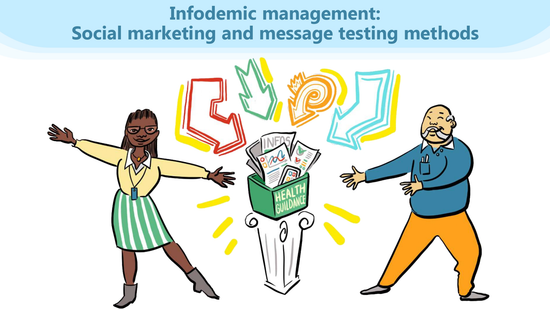
Infodemics are accelerated and amplified through digital media and offline, causing information overload and confusion. Within this noisy information environment that affects people’s perceptions, attitudes and health decisions, building adequate interventions and communicating adequate health recommendations can be challenging. This course shows how social marketing and message testing methods can help public health authorities to design effective campaigns and interventions.
Language: English
English
Health topic
Course information
This course is available in these following languages:
Overview: Public health authorities have a duty to share health information with the population so that people can adopt adequate behaviours to protect their health and the health of others. However, in our modern information ecosystem this objective can be challenged by the overflow of information of varying quality that surges across digital and physical environments during acute public health event. Social marketing and message testing concepts and methods can help public health authorities to build their health or emergency programmes and response. This course introduces the learners to social marketing concepts and methods, how they help developing effective messages and how to pre-test and post-test these messages.
Course duration: Approximately 2 hours.
Certificates: A certificate of achievement will be available to participants who score at least 80% of the total points available in the final assessment. Participants who receive a Certificate of Achievement can also download an Open Badge for this course. Click here to learn how.
Should you be interested in learning more about other aspects of infodemic management, please refer to the remaining modules of this course series:
- Infodemic Management 101
Gestion d’infodémie : Élaboration d'un rapport sur les connaissances infodémiques
Infodemic Management: Defining a taxonomy for social listening
Infodemic Management: using human-centered design good practices
Infodemic Management: Working effectively as an infodemic manager in the field
What you'll learn
- Explain how the “default” settings of social marketing favour supply side and rational thinking
- Outline the important difference between product features and user experience
- Identify and tap into the power of human values to motivate behaviour change
- Produce key elements of effective messages and how to develop them
- Explain why message testing is an important phase of campaigns
- Identify pre- and post-testing plans and considerations
- Employ best practices, evaluation and adapting to different operating contexts.
Course contents
Introduction to the course
Module 1: Social marketing and effective messages:
By the end of this module, you will be able to describe how the “default” settings of social marketing favour supply side and rational thinking; understand the important difference between product features and the user experience; and why the design thinking approach is optimal when developing a campaign; apply social marketing concepts to develop effective public health messages as part of a campaign that responds to an audience’s preferences and values.Module 2: Conducting pre-testing and post-testing:
By the end of this module, you will be able to identify different methods for message pre-testing and why this information is actionable and tactical; understand the benefits and limitations of post-testing and how, or if, your messages influence knowledge and behaviour; adopt a lighter, informal approach to pre- and post-testing when your operating environment has limitations; utilize metrics and evaluation to track the performance of your campaigns.Final assessment
Enroll me for this course
Certificate Requirements
- Gain a Record of Achievement by earning at least 80% of the maximum number of points from all graded assignments.
- Gain an Open Badge by completing the course.